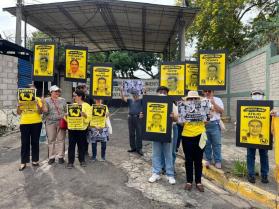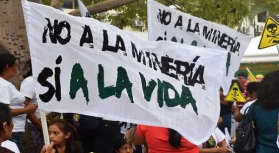Government Refuses to Release Students and Accelerates Vote on Anti-Terrorism Law
Salvadoran Movement calls for Pressure on Embassy, Consulates, U.S. Congress
The violence in San Salvador on Wednesday June 5 that lead to the death of multiple people, along with dozens injured, is being called the worst violation of human rights since the signing of the 1992 Peace Accords. Though much remains unclear about the origin of the shots which killed two riot police officers, what is clear is that the National Civilian Police (PNC) began the melee when they fired tear-gas at students who were protesting the recent increase in transportation fares and electricity rates.
Such protests – focusing on the worsening economic situation in El Salvador – have become larger and more frequent since the government approved a 25% increase in bus fares in June. The extent of the human rights violations becomes more apparent as information about the protests comes to light: from the presence of snipers on nearby buildings before the protesters arrived at the National University, to the use of live ammunition by the police, to the likelihood that Air Force helicopters strafed the University, to the violation of the autonomy of the University by the police that invaded the campus. The following day, the office of the union federation CSTS – where a press conference had been held denouncing the violence – was ransacked by the police and union leader Daniel Ernesto Morales was held and tortured for three hours. (For details about the protest and violence, go to http://cispes.org/english/Communiques_-_Action_Alerts/july5.html; for an update about the recent torture and murder of the parents of a long-time activist and community organizer see http://cispes.org/english/Updates_and_Analysis/index.html).
Meanwhile, President Saca and his ARENA party have persistently employed the term “terrorist” to describe those who took to the streets to protest on July 5. The government and the right-wing media are also utilizing the bloody events to justify the re-introduction of the “anti-terrorism law” to the National Assembly, a law that would criminalize building occupations, street blockades, and other protest tactics commonly used in El Salvador. President Saca and Minister of the Interior Rene Figueroa have led the propaganda charge by blaming the leftist FMLN party for the violence and claiming that it supports armed groups. The FMLN and the social movement have denounced the crisis as one provoked by the government and by anti-crime units of the National Civilian Police, while pointing out that such government-backed repression has been on the rise in recent months. In a related development, the first full course of the US-sponsored International Law Enforcement Academy (ILEA) was completed at the end of June (for more information about the ILEA go to http://cispes.org/english/ilea/index.html.)
Protests continue in El Salvador, and a large march is being organized for today (Friday July 7). Social movement groups are calling for international solidarity to respond, and CISPES chapters and local FMLN committees in the U.S. are organizing protests today and Monday July 10 at various consulates and at the Salvadoran Embassy in DC. Join us in demanding an end to the violence and respect for the right to peaceful protest in El Salvador - El Salvador must not return to its violent, death-squad past!
TAKE ACTION!
- Target the Salvadoran Consulate or the Salvadoran Embassy on Monday July 10. Protests are taking place at the Consulates in Boston, New York, San Francisco, Los Angeles and at the Embassy in Washington DC.. If you live in one of these cities, get in touch with a local CISPES chapter (http://cispes.org/english/Local_Committees/index.html) for more information.
If you don’t live in one of those cities, target the Salvadoran government by making a pressure call. Go to http://www.elsalvador.org/home.nsf/infoconsular for a telephone listing of Salvadoran Consulates around the country or call (202) 265-9671 / 72 for the Salvadoran Embassy in Washington DC. Ask to speak to the Ambassador or Consular and let them know you are worried about the violation of human rights to students and that the police should not be allowed to remain in the University.
- Call your Congress representative and ask them to a) call the Salvadoran government to denounce the violation of human rights, and b) to STOP Congressional funding for the International Law Enforcement Academy (ILEA) given the horrible human rights record of the Salvadoran government and police. See below for talking points and a list of the Salvadoran’s social movement demands.
List of Demands to the Salvadoran Government:
Stop the violent repression, and respect human and civil rights, including the right to peaceful protest.
Respect the constitution, including the autonomy of the National University, by removing all police and military from the campus.
Release captured students and protestors and captured union leader Daniel Ernesto Morales
Hold a transparent investigation of the excessive use of police force.
Do not pass the anti-terrorist law in the Salvadoran Assembly, a law that would only further the capacity of the police to repress the population.
Talking points for calling your Congress representative:
- According to Beatrice de Carrillo, head of El Salvador’s Human Rights Office, the violence on July 5 is the worst human rights abuse since the signing of the Peace Accords.
- The extreme economic situation that the Salvadoran people are living in today, worsened by the government’s decision to raise energy and transportation costs, is what caused the protest.
- This violent manifestation of repression is not an isolated event. The violation of human rights towards activists, youth and the population in general has been increasing in El Salvador. In fact, last week the elderly parents of a well-known activist were brutally murdered in their own home.
- The Salvadoran government is taking advantage of this incident to introduce a draconian anti-terrorist law in the Salvadoran Assembly, publicly accusing and persecuting key social activists (with no evidence), and making attacks on the FMLN.
- Not coincidentally, the first basic course of the U.S. funded International Law Enforcement Academy just concluded last week. The Salvadoran people have been expressing concern about what is being taught by U.S. officials in this Academy.

 "I am a CISPES supporter because continuing to fight for social justice and a more people-centered country means continuing the dream and sacrifice of thousands of my fellow Salvadorans who died for that vision.” - Padre Carlos, New York City
"I am a CISPES supporter because continuing to fight for social justice and a more people-centered country means continuing the dream and sacrifice of thousands of my fellow Salvadorans who died for that vision.” - Padre Carlos, New York City

